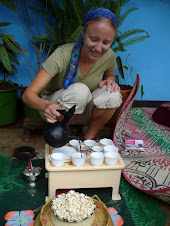The bell jangles furiously, signaling the final lap. All eyes are locked upon the pack of runners and the drama unfolding between them. Their feet pound the earth as they begin their final kick, their bodies straining doggedly against exhaustion as they vie for position. As they make the final turn, the crowd of spectators rises to its feet, breathless, as one. The roar emanating from the bleachers urges on the athletes as they make their last desperate push toward the finish line. Intense struggle marks their faces as they each fight to claim the lead. The front-runner has run a good race, though, and down the straightaway she pulls away from the pack, breaking the tape to the sound of wild cheers and thunderous applause. She stumbles wearily along the edge of the track, catching her breath, grinning at the exuberant crowd, basking in the glory of her hard-earned victory.
The Amhara Track and Field Championships are being held in Debremarkos this week, bringing together talented young athletes from nine different administrative zones to compete for regional honors. Being in attendance, I found myself carried back to the bygone days of my (rather undistinguished, though fondly remembered) competitive running career. In the midst of this foreign lifestyle, the familiar context was refreshingly comforting. It was just like all the meets I had ever been to back in the States.
Just like all those meets in the States…except, that is, for the opening ceremonies, in which each team broke into rhythmic chanting and a synchronized dance routine at the announcement of its name. There were also the Amharic singers and cultural dancers, clad in traditional Ethiopian clothing, who entertained spectators from the infield during lulls in the competition. Then there was the infield itself, not the well-groomed greenery of American stadiums but covered in yellow African savannah grasses. Also, the packed dirt track. And the lack of uniforms among the competitors. And the fact that half the runners competed in bare feet.
In fact, I can think of few things more expressive of Ethiopian culture than these track meets: the vivid array of bold colors splashed everywhere from the advertising banners, to the miscellaneous assemblage of athletic apparel worn by competitors; the predominance of the Ethiopian flag, displayed with great national pride; the cultural entertainment, bringing ancient traditions forward for modern enjoyment; the spirit of communal celebration at the end of each well-fought contest. The very nature of the sport, too, seems to reflect essential elements of the Ethiopian ethos as I have come to know and respect it during these six past months. There is the simplicity and rawness of the pure competition between runners, competition stripped of its frills and, especially here, of its technologies and elaborate equipment. There is the demand for both physical strength and great mental fortitude. There is the presentation of a great challenge, a long and strenuous road ahead, and the hope of surmounting it only through grit, determination, and an inevitable struggle. It comes as absolutely no surprise to me that
An uplifting sort of excitement accompanies being able to celebrate alongside the community and the nation in THEIR sport. It is a feeling that has been missing from the six months I have spent immersed in
In the world of distance running, however,
And still now, apart from the prestige and high stakes of the international arena, I am proud to be a part of this week of competition between Ethiopian high school students in THEIR sport. I am proud to admire their singular talent, to celebrate their local heroes, to observe how the great accomplishments of their famous countrymen have resonated throughout the nation at all levels. I am proud to share in their pride.
